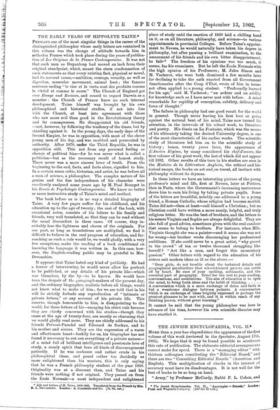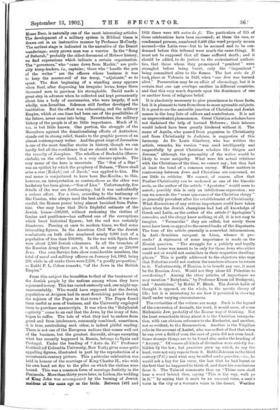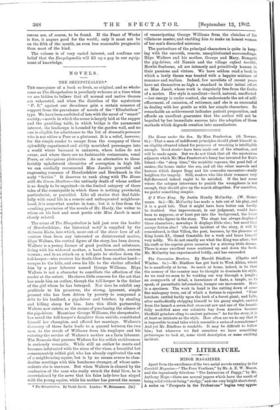THE JEWISH ENCYCLOPAEDIA, VOL. IL* MORE than a year has
elapsed since the appearance of the first volume of this work (reviewed in the Spectator, August 17th, 1901). We hope that it may be found possible to accelerate this rate of publication. The elaborate editorial arrangements cannot make for speed. There is a "managing editor" with thirteen colleagues constituting the "Editorial Board," and there are two "Consulting Editorial Boards" (American and English). This multiplication of checks in the interest of accuracy must have its disadvantages. It is not well for the best of books to be so long on hand.
"Army," by Professor McCurdy, Rabbi F. L. Cohen, and
• Th. Jewish Snerdopardia. Vol. IL, "Apocrypha — Bennah." London: Punk and Wagnalls Company. [217 for 12 rob.] Moses Beer, is naturally one of the most interesting articles. The development of a military system in Biblical times is drawn out in an instructive manner by Professor McCurdy. The earliest stage is indicated in the narrative of the Desert wanderings; every grown man was a warrior. In the "Song of Deborah," probably the oldest document of Hebrew history, we find expressions which indicate a certain organisation. The "governors," who "came down from Machir," are prob- ably troop-leaders, i.e., captains ; those who "handle the pen of the writer" are the officers whose business it was to keep the muster-roll of the troop, "adjutants," so to speak. The first beginning of a standing army appears when Saul, after dispersing his irregular levies, keeps three thousand men to garrison his strongholds. David made a great step in advance when he collected and kept permanently about him a body of mercenaries, who were largely, if not wholly, non-Israelites. Solomon still further developed the institution. But the effort was exhausting, and the military Empire, which at one time had been one of the possibilities of the future, never came into being. Nevertheless, the military history of the people is of no little importance, Much of it, too, is but little known. One portion, the struggle of the Maccabees against the denationalising efforts of Antiochus, Ovule out in strong relief, thanks to the graphic powers of an almost contemporary writer. And the great siege of Jerusalem is one a the most familiar stories in history, though we can hardly feel all the eonfidence that we should wish to have in the veracity of Josephus. The rebellion of Barkokba (Barco- chebab), on the other hand, is a very obscure episode. The very name of the hero is uncertain. The "Son of a Star" was an epithet by which the prophecy of Balsam, "There shall arise a star [Kokab] out of Jacob," was applied to him. His real name is conjectured to have been Bar-Koziba ; to this, however, an interpretation as contumelious as the other was laudatory has been given,—"Son of Lies." Unfortunately, few details of the war are forthcoming ; but it was undoubtedly a serious effort. For a tirr.s, according to the testimony of Dio Cassius, who always used the best authorities, it was suc- cessful, the Roman power being almost banished from Pales- tine. One may hope that Dio's frightful estimate of the Jewish losses-580,000, without reckoning the vietims of famine and pestilence—has suffered one of the corruptions which beset historical figures ; but the end was certainly disastrous. Passing at once to modern times, we find some interesting figures. In the American Civil War the Jewish combatants on both sides numbered nearly 8,000 (out of a population of less than 150,000). In the war with Spain there were about 2,500 Jewish volunteers. In all the branches of the Russian Army there are, it is said, as many as 250,000 Jews. Our own Service lists show cons;derable numbers, the total of naval and military officers on January 1st, 1902, being 239, while in all ranks there were 2,250, "a goodly proportion," as Rabbi F. L. Cohen remarks, "of the Jews in the British Empire."
From this subject the transition to that of the treatment of the Jewish people by the nations among whom they have sojourned is easy. This has varied curiously and, one might says unaccountably. Who would have supposed that the Jewish population at Avignon had its most flourishing period during the sojourn of the Popes in that town ? The Popes found them useful as men of business, and the University employed them to purchase manuscripts. It was when the " Babylonish captivity" came to an end that the Jews, by the irony of fate, began to suffer. The tale of what they had to endure from greed and from intolerance, commonly combined, sometimes, it is true, neutralising each other, is indeed pitiful reading. There is not one of the European nations that comes well out of the business, but the greatest discredit, always excepting what has recently happened in Russia, belongs to Spain and Portugal. Under the heading of "Auto da, Fe" Professor Gottheil (of Columbia University, New York) gives some quite appalling figures, illustrated in part by the reproduction of a seventeenth-century picture. This particular celebration was held in honour of the marriage of King Charles IL, who with his own hand set fire to the piles on which the victims were bound. This was a common form of marriage festivity in the Peninsula. More than thirty years later, in Lisbon, the wedding of King John was accompanied by the burning of Jewish maidens of the same age as the bride. Between 1481 and 1826 there were 464 autos da fe. The particulars of 115 of these celebrations have been recovered; at these the reos, or condemned persons, numbered 6,448 (the word properly means accused—the Latin reua—but to be accused and to be con- demned before this tribunal were much the same thing). It must not be supposed that all these suffered death ; and it should be added, to do justice to the ecclesiastical authori- ties, that those whom they pronounced " penitent " were strangled before being burnt, only the " impenitent " being committed alive to the flames. The last auto da fe tooli place at Valencia. in 1826, when "one Jew was burned alive." Persecution may be an affair of chronology, but it is certain that one age overlaps another in different countries, and that this very much depends upon the dominance of one or another form of religious belief.
It is absolutely necessary to give prominence to these facts, but it is pleasant to turn from them to more agreeable subjects. It is good to see the amicable junction of Christian and Jewish names in the long lists of editors and contributors. It is not an unprecedented phenomenon. Great Christian scholars have not disdained the help of learned Hebrews ; their labours would indeed have been greatly hindered without it. The name of Aquila, who passed from paganism to Christianity and from Christianity to Judaism, is suggestive of this harmony. As Dr. Louis Ginzberg, who has written the article, remarks, his version "was used intelligently and respectfully by great Christian scholars like Origen and Jerome," although the personality of the writer would be likely to rouse antipathy. What were his actual relations with the Christians of the time, we cannot say ; but they had at least the bond of a common enemy. Where matters in controversy between Jews and Christians are concerned, we see little to criticise. We cannot, of course, allow that Pauline Christianity can be reekoned as one of the Gnostic sects, as the author of the article " Apostates " would seem to assert; possibly this is only an infelicitous expression ; nor can we concede the "crass ignorance of the Christian clergy" as generally prevalent after the establishment of Christianity. What discussions of any serious importance could have taken place when the Jewish champions had lost all knowledge of Greek and Latin, as the author of the article (" Apologists ") concedes, and the clergy knew nothing at all, it is not easy to imagine. " Vernacular " they are called; but surely there must have been an appeal to the sacred books of the disputants. The tone of the article generally is somewhat inharmonious. Is Anti - Semitism rampant in Lissa, whence it pro- ceeds? A statement of some importance is made on the Zionist queelion. "The struggle for a publicly and legally assured home was meant to be only for those Jews who either could not or would not assimilate in their respective dwelling- places." This is partly addressed to the objectors who urge that Palestine could not contain the numbers who are to return to it. Unfortunately, if Zionism is to benefit any one, it must be the Russian Jews. Would not they alone fill Palestine to overflowing ? Among the other articles of importance we may mention "Babylonia," by Professor Kraus (of Budapest), and "Asceticism," by Rabbi P. Bloch. The Jewish habit of thought is opposed, on the whole, to the ascetic theory of life ; but it is interesting to see how it persisted in allowing itself under varying circumstances.
The curiosities of the volume are many. Such is the legend of the conversion of .Asenath, the work, it would seem, of some Hellenistic Jew, probably of the Essene way of thinking. Not the least remarkable thing about it is the Christian interpola- tion, with one obvious reference to the Eucharist, and another, not so evident, to the Resurrection. Another is the Virgilian echo in the account of Asahel, who was so fleet of foot that when he ran over a field of corn the ears of grain did not even bend. Some strange things are to be found also under the heading of "Augury." Of course all kinds of divination were strictly for- bidden by the law; but practices grew up which, to say the least, were not very remote from it. Rabbi Jobanan in the third century (P.C.) used what may be called sortes pueriles,—.1.e., he would ask a boy for his verse, the last that he had learnt or the first that he happened to think of, and draw his conclusions from it. The Talmud comments thus on "Thine ears shall hear a word behind thee, saying 'This is the way, walk ye in it,' " by saying that it must be an unusual voice, a man's voice in the city or a woman's voice in the desert. Weather
omens are, of course, to be found. If the Feast of Weeks is fine, it augurs good for the world ; only it must not be on the fifth of the month, an even less reasonable prognostic than most of the kind.
The volume is of very varied interest, and confirms our belief that the Encyclopaedia will fill up a gap in our equip- ment of knowledge.








































 Previous page
Previous page